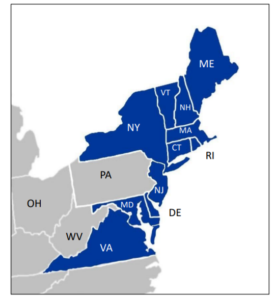
by Steve Haner
First published today by the Thomas Jefferson Institute for Public Policy.
Governor Glenn Youngkin (R) will proceed to remove Virginia from the Regional Greenhouse Gas Initiative carbon tax compact by the same route Virginia entered it: he will push to repeal the underlying regulation.
As with much else in his promised “Day One” agenda, it will actually take time. What he gave Virginia on Day One was an executive order outlining the coming steps, which still must follow the letter of Virginia’s administrative process rules. Regulations are created, amended and repealed routinely.
His administration will also notify the RGGI organization of Virginia’s intent to withdraw, a step contemplated and allowed under the governing memorandum of understanding.
It was a vote of the Air Pollution Control Board, citing authority over airborne carbon dioxide emissions, that implemented the cap and trade rules that require electric power producers to buy carbon allowances. That allowance cost is then passed on to power customers, in the case of Dominion Energy Virginia customers, directly on every month’s bill.
The Virginia General Assembly authorized (that’s the key word) Virginia’s participation in the regional compact that auctions the allowances, but no law says Virginia must belong. What everybody keeps tiptoeing around is whether the repeal vote must be taken by the same Air Pollution Control Board. Maybe not.
On paper, the members appointed or reappointed under previous Democratic Governor Ralph Northam have fixed terms to complete, and Youngkin can replace only two of the seven members come July 1. Need he wait years for a majority? Four years ago Northam fired two air board members out of the blue, right on the eve of a key regulatory vote involving the Atlantic Coast Pipeline.
A recent air board permit vote against the Mountain Valley Pipeline, unrelated to RGGI but totally related to the overall War on Fossil Fuels, will also have some Youngkin supporters clamoring for rapid change on that body.
Participation in RGGI, an interstate compact that reaches from Virginia up to New England, was first proposed through regulatory action starting under Governor Terry McAuliffe (D). Under full Democratic control, the 2020 General Assembly passed legislation which stated the Department of Environmental Quality was “authorized” to implement the program and start charging power companies for the allowances.
RGGI defenders will be scouring the code and precedents seeking to argue the bills passed actually require participation. If so, a fresh Assembly vote would be needed to reverse course, and the Virginia Senate remains under Democratic control. Be resigned to the fact some judge will probably get the question, eventually.
Since Youngkin’s initial pronouncement, supporters of the tax scheme have attacked the straw man of “repeal by executive order,” something he never actually said he would do. The lame duck Attorney General even issued an opinion that stated the legally obvious, and completely ignored the other possible path of regulatory repeal. He offered a half-answer to satisfy half-wits.
As the struggle unfolds, Virginia’s electricity producers will continue to participate in the auctions to buy carbon allowances (the next one is in March). The tax added onto Dominion bills will remain, although the company recently told the State Corporation Commission to put on hold its request for an increase in the tax rate. If RGGI remains in force, that rate hike request will be reinstated. (It wasn’t set to happen until September anyway.)
This is mainly about Dominion and its Virginia customers. Repeal of RGGI, however, would lower costs for a handful of other generation firms or manufacturers, some of them locked into contracts that have prevented them from passing the cost on in prices.
Virginia is sitting on the largest mountain of free cash flow in its history. Every tax source is bursting at the seams in the forecasts. Even the outgoing Northam Administration proposed billions in tax cuts. But the $228 million that the state extracted from its citizens under RGGI last year, expected to be $300 million this year, is suddenly crucial to the survival of Planet Earth and the Human Race.
While the administration is working to end the tax, the General Assembly should find funding for the flood mitigation projects being paid for with the dollars. Hurricanes and storm surges are real threats, even if the sea never rises another inch, and Virginia is not ready. Massive federal infrastructure funding is pending and may be sufficient for this and other purposes.
But RGGI taxes are not the only potential source of funding, nor will any of those mitigations in themselves do anything to change relative sea levels or change rainfall patterns. The constant claims that RGGI is a tool in the fight against climate change are nonsense.
Other laws passed by the Democrats when they held control do far more to force Virginia away from using fossil fuels, but without the addition of a tax consumers can see. Frankly, they will cost consumers far more over time then the RGGI taxes will. Amending or repealing them is far more important to Virginia’s economic future than dealing with RGGI.
Those laws will also be under attack in the 2022 General Assembly, but in their case, it will take legislative action to change direction, and the shrinking group of ostensibly sensible Democrats will need to decide if Virginia really can prosper in an all-electric economy tied to unreliable wind and solar sources.

Leave a Reply
You must be logged in to post a comment.